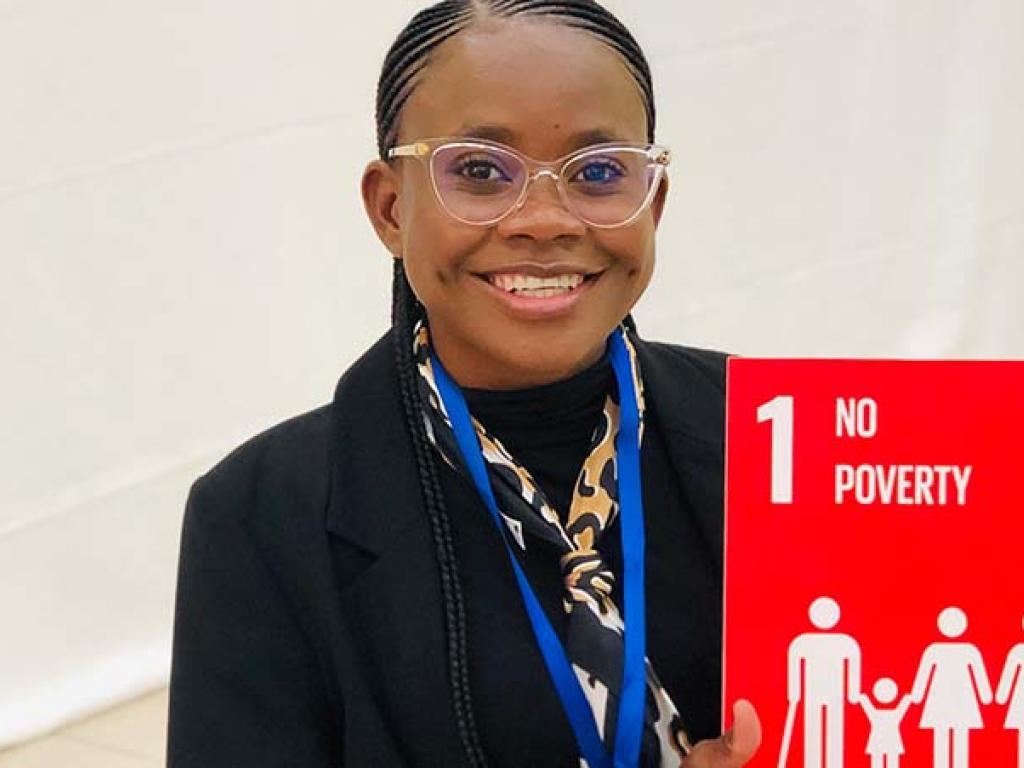Diplomacy and leadership: the UN way

Mastercard Foundation scholar, Monica Hella Ilonga was selected, through a highly competitive process, to attend the 2021 International Model UN program held in Tanzanian this August, after being nominated to attend the Nasser fellowship for International Leadership that was held in Egypt in June 2021.
The International Model UN simulation of the United Nations General Assembly gives both experienced and emerging leaders, social entrepreneurs, and changemakers from all over the world an opportunity to practise diplomatic and leadership skills through debates and discussions governed by the United Nations’ rules and procedures. This year’s theme was “Youth Engagement towards the realization of the Sustainable Development Goals (SDGs) Decade of Action".
At the conference, Monica was chosen to represent the New Zealand delegation. “Since this was defined as a decade of action, the main goal of the New Zealand delegation was to ensure that there is high youth involvement in promoting SDGs,” says Monica. She was able to engage with experienced leaders from different parts of the world, which helped her gain skills in diplomacy and leadership.
Monica is originally from the northern part of Namibia and currently resides in Cape Town, South Africa. She studied human resources at the International University of Management in Namibia. “I was delighted to receive an opportunity to pursue a master’s at the University of Cape Town for 2020, thanks to Mastercard Foundation’s prestigious scholarship.”
Working towards a Master of Philosophy in Inclusive Innovation with a thesis entitled “Education Public-Private Partnership in Namibia: challenges of high dropout rates,” Monica is determined to advocate for the inclusion of technology and data analytics to support curriculum development in Namibia and Africa at large.
Monica believes that Namibia will benefit from the Fourth Industrial Revolution (4IR) and be meaningfully involved in solving future problems, but a review of the curriculums and education policies needed to equip learners with 21st-century competence and skills is required. While working as a human resource officer at the Ministry of Education Arts and Culture in Namibia, Monica soon understood the importance of education in transforming society and decided to devote herself to improving the Namibian education system. She emphasises that “it’s time to reassess and review systematic considerations to sustainably meet those interested in education where they can realistically evolve in the world of robotics and programming.”
The Inclusive Innovation program at UCT’s Graduate School Business is designed for students committed to social change and inclusivity and who would like to develop their capacities for innovation via a deep dive into an interdisciplinary research project related to their field of practice.
“Working as a research analyst at M&C Consulting, a global Canadian company, I have had the opportunity to learn of and work with emerging patented Canadian technologies to solve societal challenges, which has inspired my research on how technology can be applied. It is a blessing to be part of the UCT family, and what I have learned is supporting my work and helping me gain more practical and innovative skills,” says Monica.
Her plans are to build an organisation that helps children from disadvantaged communities gain access to quality education. Having grown up without parents, Monica has faced many obstacles. “It has been a hard, emotional journey, full of challenges, but I never lost focus. I used those emotions and turned them into an armour of strength that has carried me forward.” She concluded that “we don’t grow when things are easy; we grow when we overcome challenges faced.”
